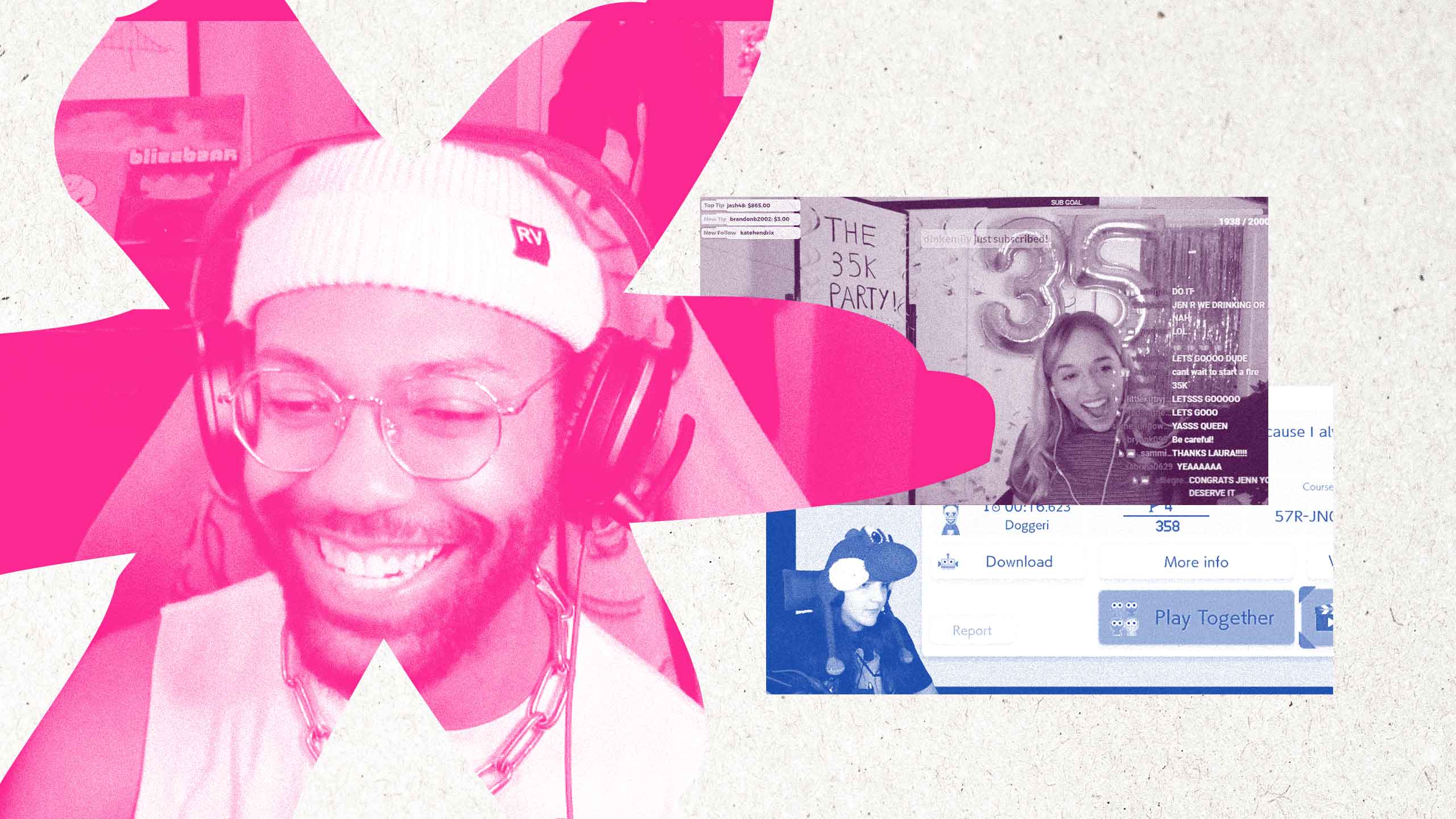Hi, pals! It’s your friendly neighbourhood senior editor, Erica Lenti, here with your weekly dose of queer goodness: “Topline”! As always, this is just a short snippet; for the whole shabang, subscribe to get Xtra Weekly delivered straight to your inbox.

This week, I’ve been thinking a lot about the queer and trans nerds making my pandemic life better. Somehow, more than a year into COVID-19 lockdowns, I’ve found comfort and community in one of the most straight, bro-ish spots on the internet. Seriously. Let’s talk about that.
What’s the buzz 🐝?
I’ve been spending a lot of my downtime on Twitch. The Amazon-owned live-streaming platform, launched in 2011, has become a go-to space for gamers and other content creators to connect with audiences across the globe, particularly during the pandemic. When the world shut down and we couldn’t connect physically, many turned to the virtual—so much so that viewers clocked a collective five billion hours on Twitch between April and June 2020.
Early on in the pandemic, while my partner worked late nights, I’d find myself curled up in bed watching people around the world play video games, make music, perform drag or just talk to their screens. Recently, I spent an hour watching cars blow by a stop sign at an intersection in Salem, Massachusetts, with 8,000 others—something about watching bad drivers with strangers felt oddly communal. Twitch streams were the easiest form of social connection I could find: They’re Covid-safe. They’re fun. I can engage with chat if I want to, or I can embrace my inner introvert, sit back and enjoy the company. It is, I’ve found, my perfect pandemic pastime.
That’s not to say the platform is always an oasis for queer people like me. Like any burgeoning social space, Twitch has also struggled to adequately support its most vulnerable users. Toxic masculinity often permeates the platform, where straight men tend to dominate. Despite increased efforts to protect LGBTQ2S+ users, it’s not uncommon for queer and trans streamers to be trolled on stream. In 2016, when the company attempted to stream a panel on diversity, its chat was bombarded with racist slurs and comments. And it’s hard to keep up with the number of marquee streamers who have said something racist while live on Twitch.
But in my experience, it’s through the support of other queer and trans folks that so many BIPOC and LGBTQ2S+ streamers make it work. And that’s how I’ve found some of my greatest comforts from home this past year.
What were we thinking 🕹️?
In the midst of a particularly bleak week last month, I tuned in to watch Youtuber-turned-Twitch bicon Jenn McAllister woo movie star Judith Ward on The Sims. It was the third in-game celeb McAllister had forged a romantic relationship with; the previous two were an actor-actress couple with a kid of their own. I watched with glee as McAllister flirted with who I can only describe as a Sim version of Holland Taylor in an oversized mansion retrofitted with a giant safe and two master bedrooms. The chat went wild (as did I).
The ridiculous nature of in-game hookups with global superstars aside, nothing felt more comforting during this pandemic than a laugh with strangers over McAllister’s attempts to make her character WooHoo with a world-famous actress. (ICYMI: The Sims calls fucking “WooHoo-ing.”) The scene was so unabashedly queer: Viewers squeed over yet another lesbian romance, and McAllister was equally delighted. Chatters were charmed that, somehow, a queer women’s love story wouldn’t end in an untimely death. And if perchance it did, that was okay, too: McAllister’s character wouldn’t mind fucking The Grim Reaper.
We’re lucky enough to be in an era of incredible LGBTQ2S+-friendly video games. From Stardew Valley or The Sims, where your character’s identity is whatever you want to make it, to more explicitly queer games like Dream Daddy or Mass Effect, we’re seeing ourselves represented in unprecedented ways in gaming. And during a pandemic, being able to escape to a supportive, pro-queer fantasy world is especially nice. As Bobby Box notes in an Xtra feature about Dream Daddy, “These fictional dates were intensely comforting. It reflected life as I know it—albeit, an idealized version where everyone is gorgeous and all sexual orientations and genders are validated—and it was nice to escape our waking nightmare and temporarily delude myself.”
Twitch lets us take that to another level. It’s exhilarating to experience that representation with a crowd of other queer folks, people who are also searching for comfort. These online spaces are havens for LGBTQ2S+ viewers who want to escape everyday microaggressions and bigotry: On McAllister’s stream, there is no bi erasure. Super Mario Maker streamers Shoujo and Shovda, both trans women, create a safe space for other queer and trans Mario fans. Smosh cast members Tommy Bowe and Courtney Miller bring mega LGBTQ2S+ vibes to the legacy game channel. Black bi streamer blizzb3ar offers queer visibility to the ever-popular Among Us crowd. And Twitch’s LGBTQIA+ tag helps you find other streamers just like them.
As vaccination programs across Canada and the U.S. ramp up, it’s exciting to see an end to this pandemic on the horizon. Until then—and very likely, far beyond then—I’ll get my queer social fix from Sim WooHoo-ing and Dream Daddy hookups. Maybe I’ll see you in the chat, too.
In other Xtra news 🌎
👉Last month, the Canadian government doled out $15 million among 76 LGBTQ2S+ organizations as part of its LGBTQ2 Community Capacity Fund. Xtra intern Logan Summer chatted with five organizations that received the funding to see how they’re faring during the pandemic, and what the money will help them accomplish.
👉“I gave Cole the scissors and trusted him with my hair and my head and my heart. It was as if he were saying, as he snipped around my bangs, ‘I love all of you, support all of you.’” In the latest instalment of “Love Like Mine,” Kate Raphael’s straight boyfriend gives her a queer haircut.
👉This month, the Yukon government introduced the most comprehensive trans health care coverage in the country. Fae Johnstone explores how the new policy provides a roadmap for the future of trans health in Canada.
👉Meet Kissy Duerré, the Saskatoon-based TikToker who’s having hard but necessary conversations about the intersections of sexism, transphobia and racism. Niko Stratis chats with the star about her growing fanbase and how she got her start.
👉Want more headlines? Subscribe to Xtra Weekly.
Gifbox
Catch me at the hottest queer pandemic club:



 Why you can trust Xtra
Why you can trust Xtra


